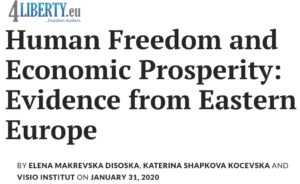Migration Toward Economic Freedom
A previous post on migration emphasized the importance of measuring economic freedom to judge policy reforms effective in reducing barriers to enterprise and prosperity. In that post Economic Freedom Indexes were recommended as tools to measure the benefits of sound money, open trade, lower regulation and taxes, judicial transparency, and other policy categories.
For students with international debate topics, advancing economic freedom across the developed and developing world reduces the appeal of populism, nationalism, nativism, and terrorism. Economic freedom reforms reduce refugees heading to developed countries and reduces opposition to both legal immigration and refugees.
Human Freedom and Economic Prosperity: Evidence from Eastern Europe, (4Liberty.eu, January 31, 2020) summarizes economic freedom measures and recommends institutional reforms:
Institutions shape human behavior, set the “rules of the game” in society, and reflect the prevailing norms and values. Both economic science and history have proved that economies and societies flourish in a market-supportive environment where institutions adhere to personal choice, self-ownership, and the rule of law.
Following the fall of communism Eastern Europe provided most of the migrants to prosperous western European countries. However, the financial crisis:
Eastern Europe has overcome the period of Soviet repression and is now oriented towards the Western values of freedom and democracy. However, 30 years after the fall of the Berlin Wall, authoritarianism in Europe is becoming increasingly popular among politicians, policy makers and the general public.
The process of globalization and the presence of transnational companies, the 2008 financial crisis followed by the European debt crisis and the rise of the populist parties and leaders in Europe, has thus created challenges to the rule of law and democracy, being truly global in nature. ..
The Human Freedom Index, co-published by Cato and Fraser Institutes, and the Liberales Institute at the Friedrich Naumann Foundation for Freedom (Vásquez and Porčnik 2018) concludes that human freedom in Eastern Europe has been decreasing over time.
Political instability and poverty send refugees and asylum seekers in search of safety and economic opportunity. With more economic freedom at home, fewer choose to risk their lives trying to find ways into the European Union and United States. Special Economic Zones and Charter Cities have been proposed as solutions to long-standing political opposition to reforms. Imagine getting a permit for an extra large industrial park where companies from all over the world can develop businesses and factories, hiring both locals and, if available, migrants from nearby.
Through 2020 the global pandemic and lockdowns overwhelmed other public policy debates, and still impact current debate topics (E.U. immigration and US military commitments). E.U. immigration is shut down due to the pandemic and the E.U. economy is depressed by lockdowns. During economic downturns, populisms surges and pressure opposing immigration and refugees increases.
Many fear the cultural impact of immigration. Critics are concerned that people migrating away from corrupt and chaotic countries will bring cultural “baggage” with them, disrupting communities they settle in. Cultural Baggage: Do Immigrants Import Corruption? (Southern Economic Journal, Vol. 85, Issue 4, February 5, 2019) asks and finds:
Do immigrants undermine culture in a way that destroys productivity in destination countries? Some scholars have argued that because immigrants come from countries with dysfunctional social capital—norms and institutions—they will import it and pollute the social capital in destination countries. One potential channel through which this could occur is corruption. We examine stocks and flows of immigrants over a 20‐year time period to see if corruption increased in destination countries. We generally find that immigration is not associated with increases in corruption. Additionally, we find that immigration tends to decrease corruption in destination countries with low levels of corruption or high levels of economic freedom.
Immigration and State Institutions: Does Region of Origin Matter? (Cato Journal, Fall 2020) argues further:
Some immigration opponents claim that immigrants import bad institutions and policies from their country of origin into their new home country. We argue just the opposite—namely, that immigrants are more likely to self‐select into countries with better institutions than those in their home countries. Researchers have examined this issue in both a cross‐country and within‐country context. Their findings have been mixed. Although others have found small or nonexistent impacts of immigrants on state institutions, those papers assume that all immigrants are the same. Our approach is unique in that it divides immigrant populations in a variety of ways.
For debaters researching E.U. immigration, understanding economic freedom measures in countries that migrants come from and go to will help them understand both the reasons for and benefits of immigration. Reviewing recent research on the cultural impacts of immigration can help focus reforms on interventionist policies that contribute to making life miserable in much of the developing world and more difficult than it needs to be in developed countries.
